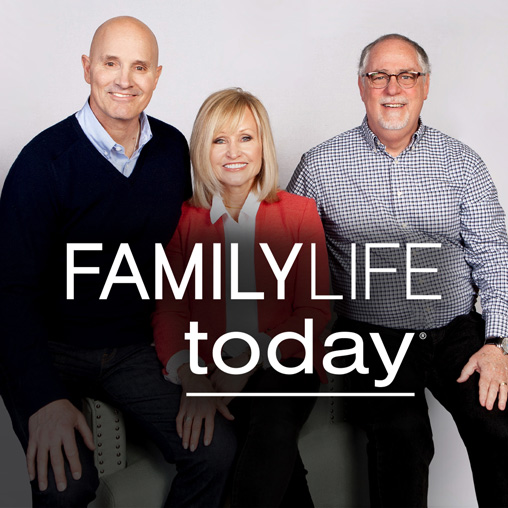
Lessons About Marriage
Bob Lepine has co-hosted FamilyLife Today for 28 years, and today, he begins his farewell week, relating to Dave and Ann Wilson some of the top takeaways on marriage from his years with FamilyLife.
Show Notes
About the Host
About the Guest
-
- Learn more about the Single Mom Circle https://singlemomcircle.com/
- Download FamilyLife's new app! https://www.familylife.com/app/
- Find resources from this podcast at https://shop.familylife.com/Products.aspx?categoryid=130.
- Check out all that's available on the FamilyLife Podcast Network. https://www.familylife.com/familylife-podcast-network/
-
Dave and Ann Wilson
Dave and Ann Wilson are hosts of FamilyLife Today®, FamilyLife’s nationally-syndicated radio program. Dave and Ann have been married for more than 38 years and have spent the last 33 teaching and mentoring couples and parents across the country. They have been featured speakers at FamilyLife’s Weekend to Remember® marriage getaway since 1993 and have also hosted their own marriage conferences across the country. Cofounders of Kensington Church—a national, multicampus church that hosts more than 14,000 visitors every weekend—the Wilsons are the creative force behind DVD teaching series Rock Your Marriage and The Survival Guide To Parenting, as well as authors of the recently released book Vertical Marriage (Zondervan, 2019). Dave is a graduate of the International School of Theology, where he received a Master of Divinity degree. A Ball State University Hall of Fame quarterback, Dave served the Detroit Lions as chaplain for 33 years. Ann attended the University of Kentucky. She has been active alongside Dave in ministry as a speaker, writer, small-group leader, and mentor to countless wives of professional athletes. The Wilsons live in the Detroit area. They have three grown sons, CJ, Austin, and Cody, three daughters-in-law, and a growing number of grandchildren.
-

Bob Lepine
Bob Lepine is the Lead Pastor at Redeemer Community Church in Little Rock, Arkansas which he helped plant in 2008. He also serves on the Board of Directors for the Great Commission Collective, a church planting ministry connecting more than 150 churches world wide. Bob also hosts Mornings on Family Radio, a network of more than 70 radio stations in the US. He is also well known to radio and podcast listeners as the long-time co-host of FamilyLife Today® and as the on-air announcer for Truth...more
Bob Lepine has co-hosted FamilyLife Today for 28 years, and today, he begins his farewell week, relating to Dave and Ann Wilson some of the top takeaways on marriage from his years with FamilyLife.
Lessons About Marriage
Bob: And welcome to FamilyLife Today. Thanks for joining us on the Monday edition/Monday, May 24th. Your hosts are Dave and Ann Wilson; I'm Bob Lepine. You can find us online at FamilyLifeToday.com.
I’ve got a verse of the year. Do you have a verse you get locked in on during the year? This is mine: it’s Ecclesiastes 3. I didn’t learn this in a Bible study; I learned this in the ‘60s, listening to the radio.
Ann: Is this your verse this year?
Bob: This is my verse for this year, yes.
Ann: Okay.
Bob: I learned it listening to The Birds and it’s: “To everything there is a season.” Everything this year you have to recognize God’s in control of things. There’s a season for everything: some seasons are hard seasons; some seasons are seasons of joy; some seasons are melancholy.
This is a season of transition for us at FamilyLife®. This week, we’re marking that transition because this will be the last week that I’ll be doing this. Starting next week, we’re handing things over to you guys, full on.
Ann: I wish you could see our faces right now.
Bob: You are going to do great!
Dave: I can’t imagine what the listeners faces are doing right now, because this is news to them.
Bob: It is news. I know any transition, it’s kind of like: “Oh, it’s not going to be the same.” It’s going to be great!
We’re marking this week: we thought I’ve been here 28 years, doing FamilyLife Today; and over 28 years, I think I’ve got the equivalent of a masters; maybe, I’m into my PhD work—
Ann: I think you’re into your doctorate.
Bob: —when it comes to marriage and family. It’s just been the daily discipline of sitting down with some of the smartest people on the planet about what the Bible has to say about marriage and family; I’ve learned so much.
I came up with 28 things—and I could have come up with 280 things—
Dave: Yes; right, right.
Bob: —but 28 things I’ve learned in 28 years. This week, we’ll walk through my top 28.
Dave: That’ll be easy.
Bob: Today, we’ll focus on 28 things about marriage. Then tomorrow, we’ll look at parenting; and then we’re going to look at the differences between men and women. We’ll look at things that all of us have learned from Dennis Rainey, and then I’ve got a bunch of miscellaneous stuff we’ll throw in on the last day.
Ann: Just don’t mind if I cry half the time; okay? [Laughter]
Bob: The marriage stuff we’re going to talk about really is connected to our experience, teaching at the Weekend to Remember® marriage getaways that we’ve done together. You’ve done it for more than 30 years; I’ve done it for the 28 years that I’ve been here.
The first night at the Weekend to Remember, we have kind of the principle that sets up the whole weekend. It’s one of those profound things that you go: “That’s really true, and understanding that helps me understand everything that’s going on in my marriage.”
The principle is that the natural drift in every marriage relationship is a drift toward isolation, and to pursue oneness takes intentionality and pursuit/you’ve got to go for it. If you don’t go for it, you’ll drift apart. Here’s how Dennis explained it on a FamilyLife Today radio program, talking about this drift in a relationship. Listen to this.
Dennis: God created marriage for a noble purpose—for a husband and wife, who are very different, to become one—and that, all your marriage, you’re going to battle isolation versus oneness. And the question is: “Where you going to end up?” Are you going to end up isolated from one another?—or are you going to battle it through, using God’s plan/God’s blueprints. and submit to Jesus Christ and end up, as a couple, one with one another?
And you know what, Bob? Today, as never before, couples need someone from the outside to just explain to them what happens in a marriage relationship, where two people who started out with such high expectations—high hope and great love for one another—can, within a matter of hours, days, weeks, months, or years—be at war with one another and be isolated from one another in marriage. And instead of experiencing intimacy, be alone in a marriage relationship.
[Studio]
Bob: I mean, isn’t that just an “Aha,” where you go: “That’s true.” No marriage is static—not standing still—you’re either drifting away, or you’re moving toward one another in oneness. If you neglect your marriage, you’ll go toward isolation. If you work together, you can get to oneness.
Dave: Yes, and it is pretty much the opposite of what a couple thinks before marriage; they think: “Oh, we’re just going to drift together.
Bob: Right.
Dave: “You know, the longer we’re together, the more in love—that’s the natural drift—is going to be toward each other.” Then you get married, and you realize it really is the opposite. You are going to drift away. The current is going in opposite directions; and you’ve got to paddle, and it is a ton of work.
I remember one time in Detroit—I don’t know if Ann will remember this—but it was a Lions home game weekend. We convinced a couple, maybe three or four Lions couples, to go to the FamilyLife Weekend to Remember in Detroit on Friday night; but they couldn’t go Saturday.
Bob: Right.
Dave: So all they heard was that talk. I remember they looked at us afterwards, like: “Well, that was discouraging.” [Laughter] We’re like “No, no, you have to come back and find out God’s plan.” But they only heard the first talk—
Bob: —the drift.
Dave: —which was the threats to oneness. Dennis did a great job; it’s so true.
Ann: I’m telling you: if you go to the marriage conference though, and that’s the only thing you get, that should put an alarm in your mind/in your head, like, “Uh oh!” because I always thought the same thing: “We’re drifting together. Our love just pulls us together and will continue to.”
Bob: The Beach Boys told us that’s how it would be. [Laughter] Brian Wilson [songwriter] said it’s only going to make it that much better when we can say goodnight and stay together. [Laughter]
Ann: There you go.
Dave: [Singing] “Wouldn’t it be nice if we…”
Bob: So the idea was: if dating is good, marriage is just going to be great!
Ann: Right.
Bob: And then we get married and go, “Why is this not working out?”
On Friday night at the Weekend to Remember, to hear the natural drift is toward isolation, you go, “Oh, this is not just us! Everybody experiences this. We’re not alone in this. The fact that we’re in isolation is because we haven’t been—
Ann: —working on it.
Bob: —“paying attention.” Yes; I just think that’s genius.
Everybody listening: your marriage is not staying static. If you’re not working on it, you’re drifting toward isolation. You have to work at it. You have to know how to work at it to pursue the kind of oneness that God intends for a marriage relationship.
Dave: And if you’re sitting there, thinking, “Okay, now what do I do?” Go to the Weekend to Remember. Go to FamilyLife.com right now, and there’s all kinds of resources that will help you combat that natural drift.
Bob: Download the app; listen to this program every day.
Ann: Right.
Bob: Do the things that are going to prompt you to move toward one another in marriage.
Alright, here’s the second thing about marriage that got implanted on my brain, early on. It’s probably the most-often quoted line from the Weekend to Remember. [Laughter] If you go up to a couple, who’s been to a Weekend to Remember, and you say, “What do you remember? Was there a big takeaway?”, I mean, at least, 50 percent of the time—
Ann: I would say so, too.
Bob: —what they will say is: “I learned my spouse is not my enemy.”
Dave and Ann: —“is not my enemy.”
Bob: I have couples say it out loud.
Ann: We do, too.
Bob: I’d say, “Here it is: your spouse is not your enemy. Everybody say it with me: ‘My spouse is not my enemy.’” Then I say, “Look at each other and say, ‘You are not my enemy.’” Some of them feel like they’re lying when they say that.
Ann: Exactly.
Dave: Well, have you looked out there, and some of them will not do it?
Bob: Right.
Dave: They’re looking at their spouse; and they want to tell us if they could: “You got us wrong. She is my enemy; she’s the one in my marriage.”
Ann: Exactly.
Bob: Here’s Dennis Rainey, again, explaining this principle that your spouse is not your enemy.
[Previous FamilyLife Today Broadcast]
Dennis: Well, if you see your marriage from a spiritual perspective, you’re going to understand that your marriage is under attack. There is a spiritual battle that is swirling around every marriage that is listening today to this broadcast. Satan is seeking to divide and to destroy Christian marriages. And that’s why it is so important for every Christian marriage to realize your marriage today is under attack. Do not be deceived. There is a destroyer that is seeking to deceive us, to cause us to think that the battle is inside our home, that the real enemy is your spouse.
And if I read Ephesians, Chapter 6, correctly, it tells me that our battle is not against flesh and blood. Your enemy is never your spouse; your enemy is never your mate; you are not at war against your husband. Your real battle is against the prince of darkness. And what he is trying to get Christians to do today is to deceive them into thinking that their real battle is internally, within their marriage, instead of realizing that the real battle is the devil. The only way we’re going to defeat him is to know the Scripture, and cling to God, and be dependent upon the truth that is found in God’s Word.
[Studio]
Bob: I mean, again, that’s such a foundational principle when a couple can look at each other and say, “You’re not my enemy. We have an enemy; there’s somebody who is trying to destroy our marriage. Rather than focusing on one another as the source of the issue, let’s recognize where the issue is. Let’s turn together and let’s do battle against Satan, who wants to destroy us.” That’s a turning point in so many marriages.
Ann: Oh, it is. I remember the first year we went to the conference, which was two weeks before we got married. Dave and I ended up really struggling that first year in our marriage. But that point stuck out to me. We were in this big fight; and I remember walking out of the room, saying, “You’re not my enemy! [Laughter] Remember that?
Dave: I actually remember it, differently.
Ann: Oh!
Dave: Yes, it was the same thing; but here’s what I remember. I got up and left the bedroom and was storming down the hall. She was in the bedroom. You yelled out into the hallway, so we weren’t even in the same room. She yelled the words that we heard at the Weekend to Remember:—
Bob: “You’re not my enemy.”
Dave: —“You’re not my enemy. What are we fighting each other for? Let’s turn and fight the enemy.” All I remember, at that moment, is thinking, “I can’t believe she’s right again.” [Laughter]
Ann: Oh, now you’re admitting it.
Dave: I remember it, because we weren’t looking at each other. I was like, “Oh, she’s always right!” She’s bringing back this point, from the Weekend to Remember, which was a couple of months before that. But think about it—we’re newlyweds—and we have a foundation that was very important to understand at that moment.
Bob: And MaryAnn and I have been married 41 years; and there are still days, where we have to look at each other and say, “Okay; you’re not the enemy.
Ann: Exactly.
Bob: “I’m not the enemy.” We just acknowledge that, and it helps us recalibrate and go: “What we’re feeling right now, it’s real—but let’s recognize what’s also real and that is—that God’s on our side on this and that we can turn to Him, and let’s fight the real enemy in all of this.”
Ann: That recognition is really important.
Bob: There’s a third point that’s probably—I’m kind of—these are the Weekends to Remember greatest hits that we’re doing here; right?
Ann: Right; yes.
Dave: Yes; right.
Bob: So there’s a third point that comes during the course of the weekend, where we help couples understand that there’s a decision every person has to make. You make it when you get married, but you have to remake it over and over again. It’s the decision that you’re going to do more than simply accept your spouse; you’re going to receive your spouse as the gift God has given you. Again, Dennis explained this in a series we did on FamilyLife Today very early after the program got started. So here’s Dennis again.
[Previous FamilyLife Today Broadcast]
Dennis: When you made a covenant to your spouse, it wasn’t just to stay married. It was a covenant to care for and to nourish them, and meet their needs, and to receive them/accept them, embrace them as God’s personal provision for your needs. And what we’ve got to do today is not reject our spouse; we have to receive them. We have to receive them in their personality, their habits, the mistakes they make, even their selfishness and how they hurt us. We somehow, in the middle of a real relationship with a real person, must embrace that person; because that is God’s assignment for us.
Bob: That’s a tough assignment for a lot of folks, who have a lot of baggage that they brought with them into the marriage relationship, or a lot of issues that have developed since they got married, where they’ve been wounded.
Dennis: Yes; and what makes it even more difficult is some Christians end up feeling like they married the wrong person, and this will really undermine your commitment. I believe the devil really uses seeds of doubt in Christian’s lives, early in their marriage, to perhaps convince them that they made a mistake. The bottom line is we need to accept and receive our spouse. If we’re married today to them, we need to accept them as God’s personal provision for us. Because you know what? You don’t have an option at this point.
[Studio]
Bob: Again, such a great principle that, if we will just change perspective and say, “God’s given me a gift—it feels some days like I got a gag gift. [Laughter] It feels some days like this is no gift; this is a millstone—but no, God knows what He’s doing. He’s given you exactly what you need and then you can accept this as the good gift from His hand. When we talk about this at the marriage conference, we talk about God presenting Eve to Adam.
Dave: And our big point at the weekend is he doesn’t just accept her.
Bob: Right.
Dave: This is now “bone of my bone.” He’s excited; he receives her because of who is bringing her to him. It’s somebody he knows well, God; and he can trust Him. And we have a beautiful picture of what marriage can be. I can choose to reject this gift from my Father, or I can receive her/receive him as an amazing gift.
I know we all have moments; we’re like, “Uh, this is not what I thought.” But at the end of the day, there is a beautiful gift in your wife/in your husband that we often miss.
Ann: I’m realizing that these are foundational truths for Dave and me; because we have built our marriage on these truths, and they’re biblical truths.
Bob: And I’m telling you—these three things we’ve talked about: your marriage drifts toward isolation, your spouse is not your enemy, receive your spouse as God’s gift for you—when you can build a marriage on that kind of a foundation, it’s amazing what God can do.
When we talk about receiving your spouse, the very next thing we talk about is the fact that there are obstacles to receiving your spouse, like everybody has weaknesses; and those weaknesses in your spouse are an obstacle. You don’t want to receive somebody who’s got weaknesses. I remember teaching through this one Saturday morning at the Weekend to Remember. I’m looking through this list of possible obstacles—things like: “Your spouse is critical/has a critical spirit,” or “Your spouse is lazy,” or “Your spouse is disorganized,”—and it dawned on me that, each one of those weaknesses, there is a corresponding strength behind that weakness.
I’m thinking, “Okay; sometimes, Mary Ann can have a critical spirit.” But I thought, “That’s because she has high standards, and those high standards are a good thing. It’s just when you overuse that it becomes a critical spirit.” Sometimes, I can be lazy. Well, I can be a laidback person. The laidback can be a good thing; lazy is not.
When you see whatever you would identify as your spouse’s weakness, you’d say, “This person just nags all the time.” Well, a person, who nags all the time, really cares about things going right.
Ann: See, this is so good. If we would all do this—think: “What are my husband’s weaknesses?” or “…my wife’s…”—and we went through that: “What’s the opposite?”
Bob: “What’s the corresponding strength with it?”
Ann: I remember our professor in seminary asked me: “Tell me what Dave’s greatest weakness is.” I’m surprised that he asked me. I was like, “Oh, I cannot stand how laidback he is. I think it’s not just laidback—I used to think it was laidback—but now I’m realizing he’s just passive. He doesn’t have any umption and get up and go.” I would go on and on.
Dave: Of course, she never told me that. [Laughter] It was like, every day, we would talk about this.
Ann: So ten years later, that same prof came and visited us. And now, he asked me: “Tell me what Dave’s greatest strength is.” Because/maybe it’s because of these principles that I had learned, I said, “I love how laidback he is, because I am so intense; I need that in my life.”
Bob: And I think we can have a conversation with one another in marriage and say, “You know, one of the things I love about you is that you really care about things being done right in our family. Now, sometimes, it does drive me crazy when that turns into nagging.
Dave: Yes; right.
Bob: “But I really do appreciate/I’m grateful for what’s behind that.
Ann: Right.
Bob: “Is there a way we can celebrate what’s good?—and kind of work on when that gets overused.”
Dave: Yes; and maybe even an assignment, as you listen today, is make a list of the great qualities in your spouse. I bet you it’s been awhile since you identified those, because it’s so easy to see the negative; but there’s a positive side to that. Write it and tell her/tell him you appreciate that about them.
Bob: Here’s the last thing about marriage that we’ll talk about today. This came out during an interview that we had with our friend, Dan Allender, who had written a book called Intimate Allies. Dan was helping me understand why leaving father and mother and forming a new union—why that’s so important.
I think in literal terms, so leaving means I don’t live with them anymore. But Dan was explaining: your parents—and their influence, and their approval, and all of that—still kind of comes with you into marriage. And when it does, when you don’t leave father and mother and form that new union, you’re sowing seeds of discord in a marriage. Here’s Dan talking about this.
[Previous FamilyLife Today Broadcast]
Dan: Well, there are three parts in that passage in Genesis 2. It says that we are to leave our fathers and mothers; we are to cleave to our wives; that we are to become one flesh. There’s a sequence that’s required for every man and for every woman.
They must leave their family of origin—and not just geographically—we’re to move together uniquely and not under the sway and power of our families of origin. Now, what happens, for example, with a husband, who does not leave his father?—and lives for his father’s approval. In one sense, his wife knows he is not trustworthy; and in that sense, a wife is often going to feel anger at her husband for not being willing to separate from the family of origin. So leaving is core; there has to be a leaving.
[Studio]
Bob: Isn’t that good?
Ann: Really good.
Dave: His voice just sounds so smart.
Ann: I know; I actually thought the same thing.
Bob: And you can see, as you work with couples, how a failure to leave—how emotional dependence on mom’s approval/dad’s approval: “This was how I was raised; I have to do it this way,”—in fact, somewhere in this conversation, I think Dan said he could trace 90 percent of a couple’s problems in marriage back to a failure to leave. When he’s working with couples, and he starts digging into what is going on, they didn’t leave mom and dad; they didn’t leave and form a whole new union.
Dave: You know what I’m amazed at?—is that Bob Lepine can remember who said what on this broadcast—
Ann: It’s so true.
Dave: —20-something years ago.
Bob: These things marked me; that’s the point as we’re going through this. I’m looking back at the things, over the last 28 years as I’ve done this, that have shaped my life; shaped my marriage; helped me understand for me, for my family, for Mary Ann and me/helped us understand: “How do you form a marriage that’s going to go the distance?”
Dave: And the neat thing is there [are] thousands/maybe hundreds of thousands that will say, “I remember Bob Lepine saying on FamilyLife Today and that marked me.” That’s a beautiful thing; think about it.
Ann: You and Mary Ann are living out those principles. That’s why they are forefront in your mind, is because you’re living them every day.
Bob: And it’s because I got catechized/I got trained, here, on FamilyLife Today. We thought our listeners might like to have these kind of core principles in a consumable format. We put together a flash drive that includes all that we’re going to be talking about this week: the 28 lessons I’ve learned in 28 years of being on FamilyLife Today. And we’ve actually taken the original programs from which each of these principles came. When you get the flash drive, you not only get our conversations, but you get to go back and listen to the programs, from years ago, where I first heard some of these core principles.
We’re making that flash drive available to FamilyLife Today listeners, who can help support the ministry of FamilyLife®, going forward. FamilyLife Today is listener- supported. Your contributions keep this program in your community, keep it on the web, keep it reaching hundreds of thousands of people every day. You make that possible as you support the ongoing work of FamilyLife Today.
We’ve had some friends of the ministry come to us recently; and they have agreed that, during the month of May, they would match every donation we receive from FamilyLife Today listeners—match it dollar for dollar—up to a total of $350,000. This is the last week for that, so we need to hear from you this week. Be as generous as you can possibly be so that we can take full advantage of this matching gift.
When you do, in addition to sending you the flash drive that I just talked about, we’ll send you a couple of books by Aaron and Jamie Ivey—both books have the same title and the same chapters—but one is for husbands; the other is for wives. The book is called Complement, and it’s about how we blend together in marriage.
And then, those of you who would like to align with us, as monthly Legacy Partners this month—we’re hoping that many of you would step in and say, “FamilyLife Today means a lot to me. I want to make sure that this program does continue. We can be monthly donors to the ministry of FamilyLife,”—when you make that first monthly gift, we’re going to send you a certificate so you and your spouse can attend an upcoming Weekend to Remember marriage getaway as new Legacy Partners. And that’s transferrable; if you want to pass that on to somebody else, you can do that as well.
We really appreciate all of you who support the ministry. Legacy Partners, we particularly appreciate your faithfulness through the years. If you’d like the flash drive and the books/if you’d like to become a Legacy Partner, go to FamilyLifeToday.com. All of the information is available there for how you can help support the ongoing work of FamilyLife Today. Again, the website, FamilyLifeToday.com; or if it’s easier, just call 1-800-FL-TODAY; we can get you all set up. Our number, again, 1-800-358-6329; that’s 1-800-“F” as in family, “L” as in life, and then the word, “TODAY.”
Now, tomorrow, we’re going to talk about parenting; because I learned a lot as we were raising our kids. There were a lot of times when I would sit down and have a conversation with a guest and go home and talk to Mary Ann and say, “Guess what I learned today? Here’s what we need to start doing.” So tomorrow, lessons on parenting from the last 28 years. I hope you can tune in for that.
I want to thank our engineer today, Keith Lynch. We got some extra help today from Bruce Goff and our entire broadcast production team. On behalf of our hosts, Dave and Ann Wilson, I’m Bob Lepine. We will see you back tomorrow for another edition of FamilyLife Today.
FamilyLife Today is a production of FamilyLife of Little Rock, Arkansas; a Cru® Ministry. Help for today. Hope for tomorrow.
We are so happy to provide these transcripts to you. However, there is a cost to produce them for our website. If you’ve benefited from the broadcast transcripts, would you consider donating today to help defray the costs?




